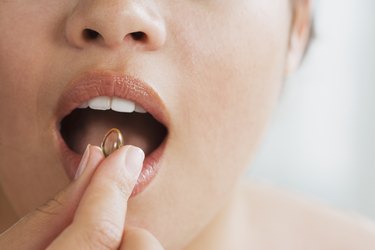
Premenstrual syndrome, or PMS, refers to a group of symptoms that people who menstruate may experience during their menstrual cycle. Specifically, PMS tends to occur between ovulation and the start of your period.
Having PMS is no fun. You may experience physical, emotional and mental symptoms that interfere with your daily life. Symptoms may include mood swings, bloating, acne and headaches, according to the U.S. National Library of Medicine.
Video of the Day
Video of the Day
PMS is very common. More than 90 percent of people who menstruate report experiencing some PMS symptoms, according to the Office on Women's Health.
Fortunately, there are some ways to reduce the symptoms. Low levels of certain nutrients may be a potential cause of your PMS symptoms, and adding them to your routine can help.
Vitamin D, calcium, B vitamins and magnesium are all nutrients that are essential for hormonal balance and are commonly associated with PMS symptoms, according to January 2018 research in the Cochrane Database of Systematic Reviews.
Related Reading
1. B Vitamins
B vitamins are important for overall health, and they play a role in energy production and metabolism. B vitamins may also play a role in reducing PMS symptoms.
Thiamine (vitamin B1) and riboflavin (vitamin B2) were found to significantly lower the risk of PMS in people who ate foods high in these B vitamins, according to a May 2011 study in The American Journal of Clinical Nutrition. It's worth noting that in this case, taking supplements didn't have the same effect.
B Vitamins to Try
2. Vitamin D
Vitamin D is an essential nutrient that most people don't get enough of. The sun is a great source of vitamin D, but many of us spend most of our hours indoors. While some foods have vitamin D, an estimated 42 percent of Americans are deficient in the nutrient, according to the Cleveland Clinic Mercy Hospital.
Low blood levels of vitamin D during the luteal phase of the menstrual cycle (which is the phase just before your period) have been linked to PMS symptoms, according to a February 2019 review in Obstetrics & Gynecology Science. Researchers recommend vitamin D supplementation as an inexpensive approach to reducing PMS symptoms.
Vitamin D Supplements to Try
- Nature Made Vitamin D3 ($11.04, Amazon)
- Nature Made D3 Adult Gummies ($7.99, Amazon)
- Naturewise Vitamin D3 ($13.99, Naturewise)
3. Calcium
Low levels of calcium during the luteal phase were also found to cause and worsen PMS symptoms, per the study in Obstetrics and Gynecology Science.
Taking calcium supplements may be especially helpful for mood-related PMS symptoms like mood swings, anxiety and depression, according to a January 2017 study in Obstetrics & Gynecology Science. A supplemental dose of 500 milligrams of calcium was suggested as an effective treatment for mood disorders during PMS.
Calcium Supplements to Try
4. Magnesium
Low levels of magnesium have also been linked to PMS symptoms. One theory is that high calcium levels interfere with magnesium absorption, resulting in low levels of the nutrient, according to Penn State Behrend.
Magnesium supplementation combined with vitamin B6 has been shown to be effective against PMS, according to a December 2010 study in the Iranian Journal of Nursing and Midwifery Research.
Magnesium Supplements to Try
The Bottom Line
Your overall diet and lifestyle could affect the severity of your PMS symptoms. People who smoke and eat a diet high in sugar, fat, salt and calories are more likely to experience PMS, according to an August 2019 study in Nutrients.
It can be difficult to pinpoint the cause of your PMS symptoms, and nutritional deficiencies may influence the severity. More research is needed in this area, but if you're concerned about PMS, talk to your doctor to see if your diet could be playing a role.
- Office on Women's Health: "Premenstrual syndrome (PMS)"
- U.S. National Library of Medicine: "Premenstrual Syndrome"
- Cleveland Clinic Mercy Hospital: “42% Percent of Americans Are Vitamin D Deficient. Are You Among Them?”
- Obstetrics & Gynecology Science: “A systematic review of the role of vitamin D and calcium in premenstrual syndrome”
- Penn State Behrend: “Premenstrual Syndrome”
- Cochrane Library: “Vitamin or mineral supplements for premenstrual syndrome”
- BMJ: “Calcium reduced PMS symptoms during the luteal phase of the menstrual cycle”
- Obstetrics & Gynecology Science: “Effect of calcium on premenstrual syndrome: A double-blind randomized clinical trial"
- The American Journal of Clinical Nutrition: “Dietary B vitamin intake and incident premenstrual syndrome”
- Iranian Journal of Nursing and Midwifery Research: “Evaluating the effect of magnesium and magnesium plus vitamin B6 supplement on the severity of premenstrual syndrome”
- Nutrients: "Premenstrual Syndrome Is Associated with Dietary and Lifestyle Behaviors among University Students: A Cross-Sectional Study from Sharjah, UAE"